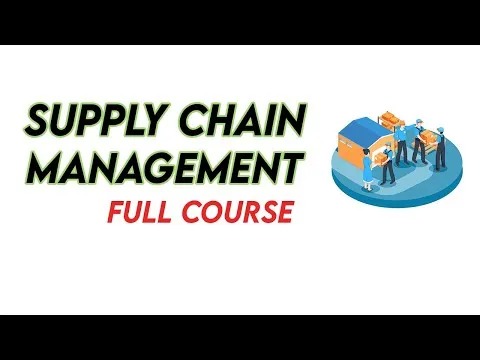
Supply chain management: Be global 
This course equips learners with the skills needed to design and manage global supply chains that are effective, sustainable and efficient. Through structured learning activities, participants will gain the future-focused capabilities to make trade-off decisions between cost, quality and flexibility in a competitive and uncertain globalised trade environment. ▼
ADVERTISEMENT
Course Feature
![]() Cost:
Cost:
Free
![]() Provider:
Provider:
Coursera
![]() Certificate:
Certificate:
Paid Certification
![]() Language:
Language:
English
![]() Start Date:
Start Date:
17th Jul, 2023
Course Overview
❗The content presented here is sourced directly from Coursera platform. For comprehensive course details, including enrollment information, simply click on the 'Go to class' link on our website.
Updated in [March 06th, 2023]
This course, Supply Chain Management: Be Global, provides an overview of the key concepts and strategies needed to design and manage effective, sustainable and efficient global supply chains. Through structured learning activities such as video lectures, quizzes, discussion prompts and written assessments, participants will gain an understanding of the trade-off decisions between cost, quality and flexibility of supply chains. They will also learn how to develop strategies to remain competitive in a globalised trade environment, and how to ensure supply chains meet customer demands while minimising costs and maximising responsiveness. Upon completion of the course, participants will have the future-focused capabilities needed to design and manage global supply chains of tomorrow.
[Applications]
The application of this course can be seen in the development of global supply chain strategies. Participants can use the knowledge and skills gained to develop strategies that are tailored to their organisation's needs and objectives. Additionally, participants can use the course to gain an understanding of the complexities of global supply chains and the importance of collaboration and communication between stakeholders. Finally, participants can use the course to develop an understanding of the importance of data-driven decision making and the use of analytics to inform supply chain decisions.
[Career Paths]
1. Supply Chain Manager: Supply chain managers are responsible for overseeing and managing the entire supply chain process, from procurement to delivery. They must ensure that the supply chain is efficient, cost-effective, and meets customer demands. They must also be able to identify and address any potential issues that may arise. As globalisation continues to increase, supply chain managers must be able to think strategically and develop innovative solutions to ensure their supply chain is competitive in the global market.
2. Logistics Manager: Logistics managers are responsible for the planning, coordination, and execution of the transportation of goods. They must be able to develop efficient and cost-effective transportation plans, and ensure that goods are delivered on time and in good condition. As globalisation continues to increase, logistics managers must be able to think strategically and develop innovative solutions to ensure their supply chain is competitive in the global market.
3. Procurement Manager: Procurement managers are responsible for the acquisition of goods and services for an organisation. They must be able to identify and evaluate potential suppliers, negotiate contracts, and ensure that the organisation is getting the best value for its money. As globalisation continues to increase, procurement managers must be able to think strategically and develop innovative solutions to ensure their supply chain is competitive in the global market.
4. Supply Chain Analyst: Supply chain analysts are responsible for analysing data to identify trends and opportunities for improvement in the supply chain. They must be able to analyse data from multiple sources, develop models to identify potential issues, and recommend solutions to improve the efficiency and cost-effectiveness of the supply chain. As globalisation continues to increase, supply chain analysts must be able to think strategically and develop innovative solutions to ensure their supply chain is competitive in the global market.
[Education Paths]
1. Bachelor of Science in Supply Chain Management: This degree program provides students with the knowledge and skills needed to manage the global supply chain. Students learn about the principles of supply chain management, including logistics, inventory management, and procurement. They also learn about the latest trends in the industry, such as the use of technology and analytics to improve supply chain efficiency.
2. Master of Science in Logistics and Supply Chain Management: This degree program provides students with the advanced knowledge and skills needed to manage global supply chains. Students learn about the principles of logistics and supply chain management, including inventory management, procurement, and transportation. They also learn about the latest trends in the industry, such as the use of technology and analytics to improve supply chain efficiency.
3. Master of Business Administration in Supply Chain Management: This degree program provides students with the knowledge and skills needed to manage the global supply chain. Students learn about the principles of supply chain management, including logistics, inventory management, and procurement. They also learn about the latest trends in the industry, such as the use of technology and analytics to improve supply chain efficiency.
4. Doctor of Philosophy in Supply Chain Management: This degree program provides students with the advanced knowledge and skills needed to manage global supply chains. Students learn about the principles of logistics and supply chain management, including inventory management, procurement, and transportation. They also learn about the latest trends in the industry, such as the use of technology and analytics to improve supply chain efficiency. Additionally, students learn about the latest research and development in the field, such as the use of artificial intelligence and machine learning to optimize supply chain operations.
Course Syllabus
Strategic supply chain management in global markets
Welcome to week 1 of Be global! This week you will start the discussion of global supply chains and supply chain management. You will examine a number of global supply chains and their components. You will explore global supply chains from various perspectives including their main product/service offerings and how it would affect the nature of supply chains and their characteristics. And you will investigate strategic fit in supply chains and the ways to ensure your supply chain strategies are well aligned with your operational capabilities and global market requirements. So are you ready to start this week?Logistics drivers of global supply chains
You might have heard of supply chain management being associated with the term 'logistics' as 'supply chain logistics'. Logistics plays a critical role in efficient supply chain management and that is why sometimes its name is synonymous with supply chain management. This week you will be equipped with the knowledge of the main logistics drivers in supply chains and the trade-offs that can be made between each two sets of logistics drivers. These trade offs would of course reflect supply chain strategy and by using several case examples, you will learn how to consider these trade offs and when to apply them. You will also learn about the push and pull strategies in supply chains and why they complement your decisions about the logistics drivers. So if you are ready, let's jump into this week's content!Principles of global supply chain network design
If you want to expand your business globally, or if you have been tasked to develop your supply chain network in a new country or market, how do you approach this problem? What decisions do you have to make? What are the main considerations you need to focus on? Going global or expanding your business globally has certain requirements and implications for supply chains. This week you will learn about all these requirements and how they can be formulated in a specific global contextSourcing decisions in global markets
The success or failure of many small to large businesses globally often are dependent upon their sourcing decisions. As a supply chain manager you need to make the right decisions about in-house production or outsourcing, selecting your suppliers, and how much inventory and from whom to buy as some of the most fundamental yet complex decision tasks that businesses and supply chain managers should fulfill. By the end of this week you will have tools and techniques to help you in this decision making process.Risks and sustainability in global supply chains
There is not a day passing by that you do not hear about a major natural or man-made disaster happening around the globe. These adverse events usually disrupt business operations and in severe cases impose millions or billions of dollars of financial and/or reputation losses to businesses. The study of risks and sustainability in supply chains will specifically enable you to identify these sources of risks and developing remedies to manage these risks and their consequences to achieve resilient and more sustainable supply chains. By reviewing and practicing this week's content you will gain a deep knowledge of how global businesses manage risks and sustainability in their supply chains.Supply chain diagnostic framework
Throughout this course you have been introduced to the supply chain diagnostic framework that contains all the fundamental theories and schools of thoughts that a global supply chain manager should know and adopt. This week you will put your knowledge into test and see if you can apply it to various business cases. You will be also introduced to more contemporary debates in global supply chain management in the use of disruptive technologies in supply chain operations.Pros & Cons

Insightful and simple language

Theoretical knowledge mixed with case studies

Wide range of topics

Good speaking and teaching style

Systematic approach

Minigame

Clear and pragmatic

Not updated with current context

Missed learning opportunity

Tricky minigame
Course Provider

Provider Coursera's Stats at AZClass
Supply chain management: Be global equips learners with the skills needed to design and manage effective, sustainable and efficient global supply chains. Through structured learning activities, participants will gain the future-focused ability to make trade-off decisions between cost, quality and flexibility in a competitive and uncertain global trading environment. This includes understanding the trade-offs between cost, quality and flexibility, and how to make strategic decisions that balance these factors. Participants will also learn about the competitive and uncertain global trade environment and how to ensure supply chains meet customer needs while minimizing costs and improving responsiveness.
Discussion and Reviews
0.0 (Based on 0 reviews)
Explore Similar Online Courses

Joining Technologies For Metals

Deep Learning for Business

Python for Informatics: Exploring Information

Social Network Analysis

Introduction to Systematic Review and Meta-Analysis

The Analytics Edge

DCO042 - Python For Informatics

Causal Diagrams: Draw Your Assumptions Before Your Conclusions

Whole genome sequencing of bacterial genomes - tools and applications

MIT Free Supply Chain Management Courses

What Are Good Supply Chain Certifications?


Start your review of Supply chain management: Be global